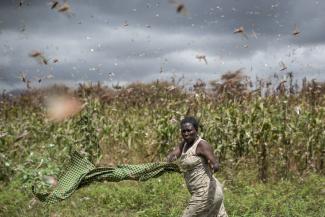Blog
Central bankers sounding climate alarm

The Bank for International Settlements (BIS) is based in Basel and serves as something like an umbrella organisation of central banks. It does not normally make headlines and has a history of promoting orthodox economic theories. In a recent publication, on which it cooperated with the French central Bank, Banque de France (BdF), it calls for two paradigm changes.
The study is called “The green swan”. As the authors elaborate, the term refers to what is called “black swan event" in economic theory. These events are unexpected and rare; have wide-ranging or even extreme impacts, and they can only be explained after the fact. An economic crisis is likely to be severe if a black swan event triggers it, and policymakers will not know how to come to grips with it.
“Green swan events”, as defined in the BIS publication, are black swan events with environmental causes. The authors worry about global warming in particular, but they also point out that other issues, the erosion of biodiversity, for example, may trigger severe crises too.
Green swan events are more dangerous than conventional black swan events, according to the study. The reason is that economic policymaking cannot undo the environmental damage. Inflation, for example, can cause severe suffering in a country, but once the central bank and the finance ministry manage to halt it, a restart is possible. If, by contrast, the environmental foundations of an economy are broken, the central bank and the finance ministry can’t do anything about it.
The authors insist that green swan events have become so probable that central banks must prepare for them. To do so, they must adopt new methods for assessing risks. In the past, it was basically considered enough to compare current data with historical data in order to see whether a problem was building up that resembled a previous problem. In view of fast change, that approach no longer makes sense. The great challenge is to understand what new risks arise, how to assess them and what to do about them.
Adopting entirely new methods is the first paradigm change the study demands. The authors warn that central banks must act if they do not want to be overwhelmed. Food-price inflation may become severe, they argue, should harvests be destroyed by flooding, storms and drought. Problems may be compounded by harvests never returning to normal again. Moreover, climate disasters could erode people’s wealth by destroying uninsured assets, reducing both their purchasing power and productive potential. On the other hand, insurance and reinsurance companies may prove unable to pay for all the damages that are insured. In such cases, systemically important financial-sector corporations may have to be bailed out.
The authors demand that central banks take into account what climate-related risks financial-sector companies are running. They want those companies to report to the public on these matters. Eco-risks should have a bearing on their access to capital. For example, those running high risks should have to pay higher interest rates. On the other hand, they want distributional impacts to be assessed – both of global warming and of policy responses. The BIS publication warns that poor and poor countries are affected worst. As policy implementation depends on broad public acceptance, it insists that disadvantaged parties must be compensated for hardships.The study does not deal with carbon pricing. The authors state that it is necessary and has been discussed for decades, but policymakers have done too little to bring it about. Now, much more must happen. The expert team even suggests that governments should engage in deficit spending in order to boost climate-friendly technology and build carbon-neutral infrastructure. They find global warming more worrisome than government debt, and in view of currently low interest rates, they suggest that states have fiscal room for manoeuver. This is an unusual message from the normally orthodox BIS.
This message, however, fits the second paradigm shift the BIS experts demand. They want central banks to assume a new role in convening relevant actors and building alliances to promote effective climate action. They want central banks to become engaged at national and international levels. They insist, among other things, that rich nations must support adaptation and mitigation measures at least to the extent promised.
Quite obviously, top-level leaders and technical experts at the BIS and the BdF experts deserve praise for spelling out that the climate crisis will have serious impacts on the world economy. They express regret for research on the economic risks only having begun quite recently. To some extent, that is an admittance of guilt. That global warming is dangerous was spelled out clearly at the Earth Summit in Rio de Janeiro in 1992. Why have central-bank economists neglected the matter for so long?
The BdF, of course, is part of the European Central Bank (ECB) system. I find it quite encouraging that Christine Lagarde, the new ECB president, has made statements that point in the same direction as “The green swan”. Even better, the European Commission should prove a cooperative partner. Under its new president, Ursula von der Leyen, it has launched a European Green Deal. As Gerd Müller, Germany’s Federal Minister for Economic Cooperation and Development has pointed out on our platform, fighting climate change is of great developmental relevance.
Link
BIS – Bank for International Settlements, 2020: The green swan – Central banking and financial stability in the age of climate change.
https://www.bis.org/publ/othp31.pdf













